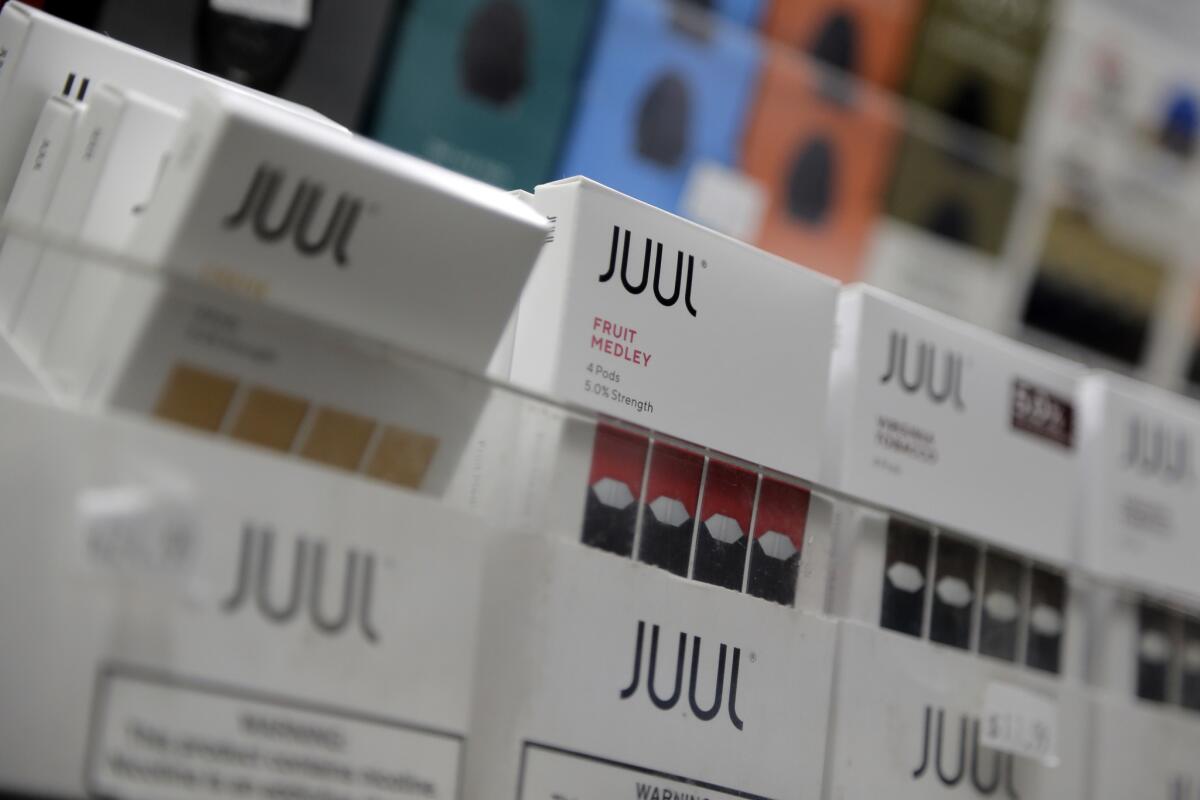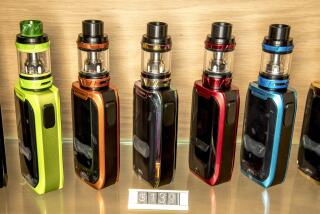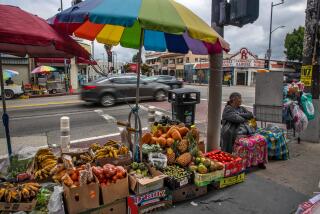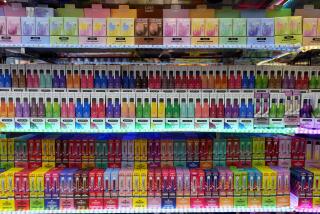A ban on sales of flavored tobacco for e-cigarettes could be coming to L.A. County

Los Angeles County could soon become the nation’s largest jurisdiction to ban the sales of flavored tobacco — a move aimed at fighting what public health officials increasingly call an epidemic of e-cigarette use among teenagers.
Under a proposed ordinance that the Board of Supervisors is expected to consider next month, stores in unincorporated areas would no longer be able to offer any tobacco products with a flavor in any form. That includes e-cigarettes with fruity pods of liquid nicotine, traditional menthol cigarettes, mint chewing tobacco and cream cigars, among other products.
The plan also would require new or existing tobacco shops to get business licenses, according to a draft of the ordinance viewed by The Times.
The new rules would be enforced starting in February 2020. Businesses that don’t comply could have their licenses suspended.
Public health advocates praised the county’s plan, saying it could help cut the alarming amount of e-cigarette vaping by young people.
“It’s a tremendous undertaking to make such a sweeping change in legislation,” said Jessica Sims, a healthcare administrator who is on the board of the American Heart Assn. in Los Angeles. “It’s the right thing to do. It will protect kids and reverse a trend.”
While less harmful for adults than regular cigarettes, the long-term health effects of e-cigarettes remain unclear, according to the U.S. Centers for Disease Control and Prevention.
However, research does show that nicotine use by young people — including by vaping devices — can affect brain development and lead to addiction, impulsiveness and mood disorders. The U.S. Food and Drug Administration reported last year that use of e-cigarettes and flavored tobacco products by youths had “hit epidemic proportions.”
“When I talk to adults, they don’t realize that it’s really a dire problem,” said Lisa Lu, a San Marino High senior who started a nonprofit to reduce smoking here and overseas.
The daughter of a cardiologist, Lu spent her early childhood in a smoke-free world — a sheltered upbringing that changed on a freshman year trip to China. There, she saw the prevalence of smoking in public, where it’s especially common among men. It opened her eyes to how tobacco use can become normal in a society.
She fears that the rising popularity of vaping could lead to another generation of Americans addicted to nicotine, and she’s traveled to L.A. County’s Hall of Administration and to Capitol Hill to lobby against flavored tobacco.
“It’s actually something that’s really pressing right now,” she said.
One in 10 high school students in Los Angeles County is an e-cigarette user, according to a study by researchers at UC San Diego. Among those students, nearly all report a preference for flavored tobacco products.
About 60% of all current e-cigarette users reported purchasing the products in vape shops, the study found.

The county’s public health department and treasurer and tax collector’s office have scheduled a webinar in early September to offer more information to retailers and others interested in the proposed changes.
A growing number of local and state governments are considering or have already implemented similar tobacco bans in recent years. The city of Los Angeles is studying the issue. In the Bay Area, several local governments, including San Francisco and San Mateo County, have outlawed sales — as has the city of Sacramento. An effort to adopt a statewide ban fizzled earlier this year in the Legislature.
Industry groups, as expected, say they oppose L.A. County’s proposed restrictions.
Ryan Hanretty, executive director of the California Fuels & Convenience Alliance, which represents gas stations, said his members are committed to complying with the state’s current age restrictions on tobacco sales.
“Unlike online sales or the black market created by government bans, convenience stores are highly regulated, with a trained employee performing ID checks at the point of sale,” he said.
L.A. County began crafting the proposed ordinance last year, after Supervisor Mark Ridley-Thomas requested more scrutiny of vape shops in his district. That led to a motion in September ordering county officials to study requiring the shops to be licensed and for regulations on flavored tobacco.
Ridley-Thomas has raised concerns in the past about the large number of tobacco and vape shops in his district, which includes many poor neighborhoods in South L.A. He also has echoed the concerns of health advocates, who worry that the rise of e-cigarettes has eroded decades of efforts to reduce smoking among all Americans, but especially young people.
“We thought we had overcome some of these problems with the traditional cigarette industry,” he said during a September 2018 meeting. “It’s back in our faces again.”
More to Read
Start your day right
Sign up for Essential California for news, features and recommendations from the L.A. Times and beyond in your inbox six days a week.
You may occasionally receive promotional content from the Los Angeles Times.







